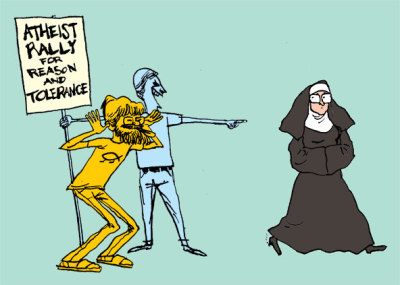The Problem of Village Atheism

I have been blogging for a decade now, primarily on topics in theology, current events, and apologetics. During that time, I have noted the extensive presence of village atheism within the "infidel" blogosphere. While the blogosphere also has its share of "village Christians", what is particularly ironic about the proliferation of village atheism is the fact that the online atheist/skeptic community persistently tries to brand itself as being especially rational, critical, and objective. And yet, the widespread and vocal opinions of the village atheists directly contradict this aspirational branding.
First, a word on terminology. So far as I can see, the term "village atheist" was first popularized in the 19th century to refer to an atheistic individual within a religious community who vocally (and provocatively) expresses his/her dissent from the religious consensus of the community. For example, G.K. Chesterton identified Thomas Hardy as a village atheist (see Kevin Taylor, Hans Urs Von Balthasar and the Question of Tragedy in the Novels of Thomas Hardy, p. 168).
However, in more recent literature the meaning of the term has evolved to identify a type of popular atheism that is often brash in presentation and lacks critical nuance. (In other words, minority status within a wider religious community is no longer essential to the term.) One sees this use in Peter van Inwagen, The Problem of Evil, p. 178 when Inwagen juxtaposes the unlettered popular opinions of the "village atheist" over against the more sophisticated opinions of the "atheist". In this article I will be using the term "village atheist" in the broad sense used by Inwagen.
If you want to see how widespread village atheism is (and how virulent in expression), just consider the success of atheist Peter Boghossian's book A Manual for Creating Atheists. As I pointed out in my review, the book is a poorly written screed that makes a litany of claims that range between the patronizing and the absurd. For example, Boghossian asserts that any theist who fails to respond favorably to an atheist's explanation of their beliefs must be brain damaged. Apparently only a brain damagedperson could fail to see that atheism is true.
A Manual for Creating Atheists is a terrible book. But it has also been a very successful book, selling thousands of copies and amassing more than 400 reviews on Amazon.com averaging 4 1/2 stars. That's a lot of village atheists.
So what exactly is a village atheist? As I define it, this individual is characterized by several traits including the following:
The proliferation of binary oppositions: Perhaps the most common (and troubling) hallmark is the simplistic categorization of people into two groups: the irrational, delusional religious "faith-heads" and the rational, irreligious skeptic. Boghossian's book is a disturbing example of this opposition.
A claim of righteous indignation: Village atheists frequently claim the moral high ground. They are angry at biblical atrocities, the problem of evil, God, intelligent design, the Discovery Institute, Answers in Genesis, Muslims, hijabs, the Crusades, etc. Unfortunately, this alleged righteous indignation often provides a cover for them being overly emotional, rude, xenophobic, and moralizing.
Lack of prior theoretical reflection: Village atheists frequently make bold assertions without a theoretical framework to back-up those assertions. For example, they will claim "Belief in God is irrational" without a defensible theory of rationality to justify the assertion. Or they will claim "You're a Christian because you were born in Kentucky" without a defensible theory of why social location defeats one class of belief (e.g. "religious") but not another (e.g. "non-religious").
Short attention span: This becomes especially evident when you challenge the village atheist to provide a theoretical framework to back-up their various incendiary assertions. Instead, if any response is forthcoming, it is typically the invocation of some new red herring or rabbit trail.
Unresponsiveness to criticism: You can spend the afternoon arguing with a village atheist, carefully deconstructing some point they've made, only to have them repeat the very same point (perhaps in slightly amended form). This is indicative of doxastic closure.
Caricaturing the opinions of others: Village atheists tend to caricature the views of other people, setting up and knocking down strawmen. (See for example, how Boghossian defines "faith".)
The proliferation of tribalism: Village atheists tend to look askance on internal criticism (i.e. one atheist critiquing another), instead insisting that efforts must be focused on attacking Christians and other "religious" people (i.e. the out-groups).
As I already noted, there are also many village Christians who exhibit similar traits. (But the way, it should not surprise us that when village Christians leave the church, they typically become village atheist.)
We should also keep in mind that many atheists are highly intelligent, charitable and reasonable. That is definitely another lesson I've had driven home after ten years of blogging.
But that doesn't change the fact that the online infidel community has a large and very vocal number of village atheists. And I think it behooves the leaders of that community who are intelligent, charitable and reasonable to take a more vocal stance against the vocal village atheists, especially if they want to continue to claim the mantle of rationality and intellectual credibility.




















